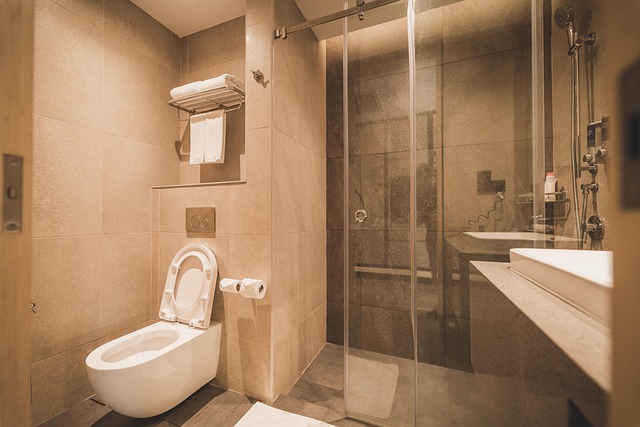Revolutionize Remote Restrooms: Solar-Powered Portable Units Now

Solar-powered portable restroom units offer an eco-friendly and sustainable sanitation solution for…….
In the vast expanse of our planet, there are countless remote areas where traditional infrastructure may be lacking—a challenge that has inspired innovative solutions in recent years. Among these innovations, solar-powered portable restroom units have emerged as a game-changer, offering a sustainable and accessible approach to sanitation in off-grid locations. This article aims to provide an in-depth exploration of this topic, covering various aspects from its definition and global impact to technological advancements and future prospects. By the end, readers will gain a comprehensive understanding of how these portable units are transforming access to clean water and hygiene in remote communities worldwide.
A solar-powered portable restroom unit is an innovative sanitization solution designed for areas without access to centralized plumbing or electricity. These self-contained facilities typically consist of:
The concept of portable restrooms has been around for decades, but integrating solar power has revolutionized their efficiency and environmental impact. Historically, remote locations relied on portable toilets or open-air facilities, leading to health concerns and unsanitary conditions. Solar technology in sanitation is a relatively new development, driven by the global push for sustainable solutions and off-grid living. These units are particularly valuable in:
The adoption of solar-powered portable restroom units has spread globally, driven by environmental awareness, public health concerns, and the remote nature of many regions. Key players in this space include:
Different regions face unique challenges:
The global portable restroom market is expanding, driven by factors like increasing outdoor recreation, construction boom, and disaster relief efforts. Solar-powered units represent a niche but rapidly growing segment due to their environmental benefits and reduced operational costs over time. Key market players include specialized manufacturers and technology providers, while rental services are also popular for temporary events and emergency responses.
Private investments in solar restroom technologies have been steady, with venture capital funding research and development, and commercial enterprises deploying these units on a large scale. Government grants and partnerships play a crucial role in promoting off-grid sanitation solutions, especially in developing regions. The growing awareness of sustainability and social responsibility among investors is driving the market’s growth.
These portable units contribute to local economies:
Solar panel efficiency has improved dramatically, with advancements like:
Technological advancements in water purification include:
IoT devices enable remote monitoring and control:
The development of solar-powered portable restroom units is guided by various policies and regulations:
Deployment of these units requires permits and licenses:
Some challenges include:
Criticisms and potential solutions:
At the renowned Coachella Valley Music and Arts Festival in California, solar-powered portable restrooms were implemented to handle the massive influx of attendees. These units provided a clean and comfortable experience, reducing the festival’s environmental footprint. The success at Coachella has inspired similar deployments at other major events worldwide.
In a remote village in northern India, a local NGO partnered with a tech startup to deploy solar-powered restrooms. Within months, the community noticed improved hygiene and a significant reduction in water-borne diseases. The units also became a gathering place for villagers, fostering social interaction.
After the devastating earthquake in 2010, non-profit organizations provided portable restrooms to affected areas in Haiti. These facilities helped prevent disease outbreaks and improved sanitation conditions during the rescue and recovery efforts.
The future of solar-powered portable restroom units holds immense potential:
Technological advancements to watch:
To capitalize on future prospects:
Solar-powered portable restroom units represent a significant step forward in addressing global sanitation challenges, particularly in remote locations. Their environmental friendliness, efficiency, and adaptability make them a sustainable solution for various applications, from outdoor events to disaster relief and rural development. As technology advances and awareness grows, these units will play an increasingly vital role in ensuring access to clean water and hygiene worldwide.
Q: Are solar-powered portable restrooms more expensive than traditional options?
A: While the initial setup cost may be higher, solar restrooms offer long-term savings due to reduced operational expenses and environmental impact. Additionally, grants and incentives can offset these costs.
Q: How do these units handle waste disposal in remote areas?
A: Advanced water purification systems treat blackwater on-site, ensuring safe disposal or transport off-site. Local regulations guide the method of disposal, considering ecological impacts.
Q: Can solar restrooms be customized for different cultural preferences?
A: Absolutely! Customization is key to success. Understanding local customs and incorporating designs that respect cultural norms ensures better acceptance and usage.
Q: What role do these units play in disaster response?
A: Solar-powered portable restrooms provide critical sanitation facilities during emergencies, helping relief efforts by preventing disease outbreaks and ensuring basic human dignity for affected populations.
Q: Are these units energy-efficient?
A: Yes, the solar panels harness renewable energy, making them highly efficient. Modern designs also incorporate energy-saving features, minimizing overall energy consumption.

Solar-powered portable restroom units offer an eco-friendly and sustainable sanitation solution for…….

Solar-powered portable restroom units transform sanitation in remote areas by offering eco-friendly…….

Solar-powered portable restroom units for remote locations are gaining popularity among event organi…….

Solar-powered portable restroom units transform sanitation in remote areas, offering sustainable, se…….

Solar-powered portable restroom units for remote locations offer a sustainable solution to outdoor e…….

Solar-powered portable restroom units provide an innovative, sustainable solution for remote locatio…….

Solar-powered portable restroom units provide a sustainable solution for remote locations, combining…….

Solar-powered portable restroom units offer a sustainable solution for remote locations, reducing en…….

Solar-powered portable restroom units transform hygiene in remote areas, offering sustainable altern…….

Solar-powered portable restroom units provide an innovative solution for sanitation in remote locati…….